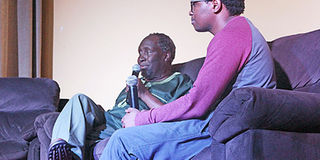Online literary magazines have not been spared from digital turbulence

Ngugi wa Thiong'o with Moses Kilolo, the managing editor of Jalada. PHOTO| MARGARETTA WA GACHERU
What you need to know:
- This question wasn’t taken well by the magazine’s founders and their supporters and many of them went to social media platforms to criticise our article and declare us ‘haters’.
- Two years down the line, there is good news. Enkare has survived and is currently involved in groundbreaking and ambitious writing projects.
A couple of years back, when Enkare Review burst into the Kenyan literary space with much fanfare, we asked one simple question: Would Enkare survive or would it become a headstone in the digital literary graveyard?
In an article published in the Saturday Nation on October 28, 2016, we wondered if the magazine would survive its first year.
This question wasn’t taken well by the magazine’s founders and their supporters and many of them went to social media platforms to criticise our article and declare us ‘haters’.
Two years down the line, there is good news. Enkare has survived and is currently involved in groundbreaking and ambitious writing projects.
However, it is important to note that this survival has had its fair share of upheavals, the most memorable being the terrible social media fight that pitted one of its founders against the rest of the team.
The former was expelled and both he and the remaining team flooded the Internet with accusations, statements and screenshots of chats and e-mail exchanges.
This flare-up is not a common occurrence as most of the struggles within the Kenyan and East African literary spaces are invincible and happen away from media focus.
Enkare weathered that storm and is back on its feet and that bitter fight becomes a hint, in retro, of the seething volcano of ceaseless improvisations shaping the continent’s literary scene.
Enkare is not the first or even the only literary magazine to have had this sort of social media spat. It is thus natural to wonder whether this baptism by fire has produced any good results in the spaces within which it happens. Or if it has matured and catapulted the magazine to the next phase of growth.
The answer to this question may lie in another Kenyan literary collective, Jalada.
FAIR SHARE OF TEETHING PROBLEMS
Started in June, 2013, Jalada has also faced its fair share of teething problems. In fact, we are reliably informed that its new editorial and management structure came about as a result of a long and bruising fight which saw many of its founding members leave the collective in protest.
Just like Enkare, the collective almost collapsed under the weight of its most recent transition tussle predicated on a weak structural system and the advent of strong individuals who became the face of the collective and who were accused of non-inclusive enjoyment of the perks that came with its success. This was one of the probabilities mentioned in the 2016 article.
The question then arises: Have the zines learnt anything new from the aforementioned misunderstanding? Are they better than they were before?
Both Enkare and Jalada seem to have gone into new phases of literary growth and established a semblance of concrete internal systems that portray a unique resilience of necessity.
We are encouraged by the new no-nonsense way Jalada and Enkare have embarked on forward-looking collaborations.
Enkare for one, has collaborated with Uganda’s Writivism, where it now publishes the winning pieces from Writivism’s nonfiction Koffi Addo prize. It has also partnered with Naijographia on an exhibition and has, during the last year’s charged elections, put forth excellent think pieces on the elections in its ‘A sense of where we are (?)’ theme.
Jalada, too, has been moving literary mountains and collaborated with Transition magazine, Writivism and lately, the Edinburgh International Book Festival. These collaborations and partnerships across the globe offer new possibilities and a much-needed mentorship for the literary platforms as a shift towards more high quality global standards of output. It also benefits the magazine members as they exchange ideas and acquire new standards and work ethics.
In the past, it was Kwani? and Chimurenga who used to offer the promise of successful literary journals and in a roundabout way the motif and method to aspirational literary start-ups.
These became the literary true north and set the standard unit of literary quality. That many of the youths got frustrated that they could not either get their works in these journals meant that an organic artistic groundswell could not be housed. It is thus easy to conclude that Kwani? or Chimurenga may not have envisioned that college kids whose plans were to be urgently published in these journal’s pages could go on to steal the show. Yet times have changed and that is in fact the case right now.
Even so, Kwani? and Chimurenga barely offer any lesson to Enkare and Jalada. The zines, which are yet to get any mainstream funding to run their literary projects, still offer anyone with interest in the African digital storytelling space an opportunity to look into what works and how.
In the 2016 article, we suggested that the online platform is a kind of harambee that needs many small feats building into an African literary canon. Jalada’s and Enkare’s resilience and new overtures into regional and global partnerships have proved our observation right.
There are no one-stop solutions for such literary spaces on the organisational and structural levels, only experience and youthful exuberance coupled with long term commitment is needed.
Nevertheless, these glimpses do not paint a full picture of what digital platforms and zines’ projected life cycles can look like given that an earlier entrant into the digital space; Africa Writing Online is somewhat frozen in time.





